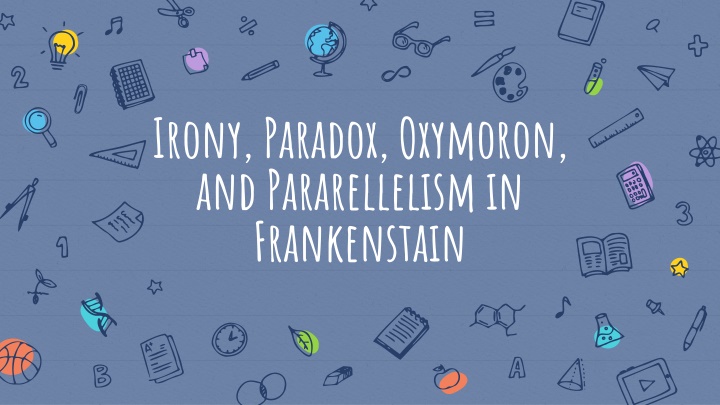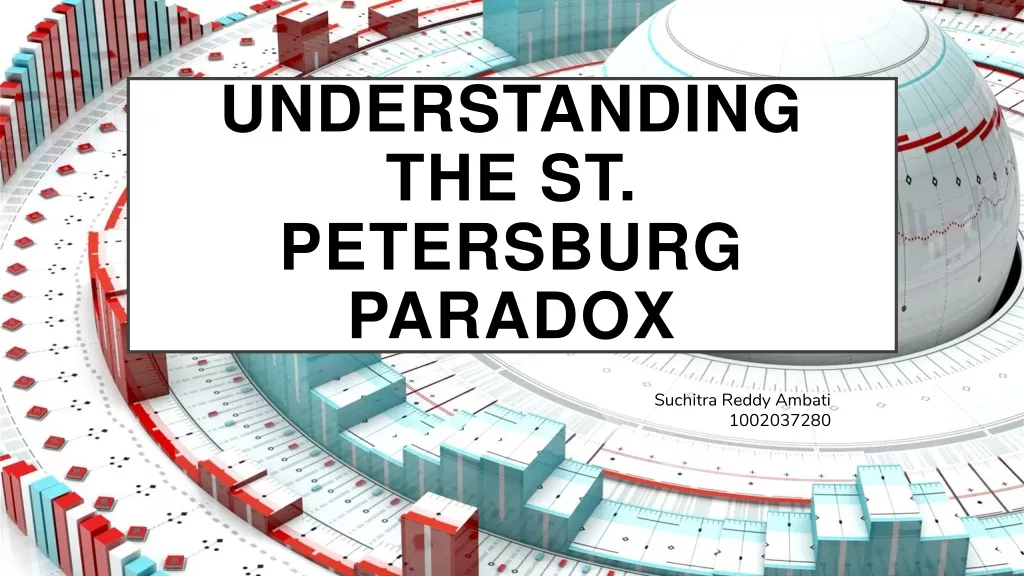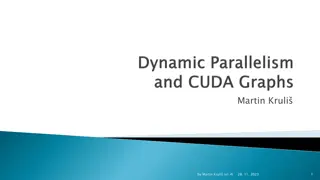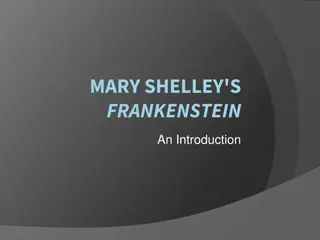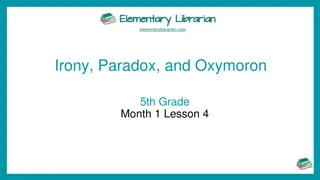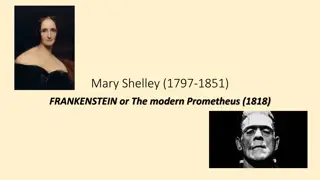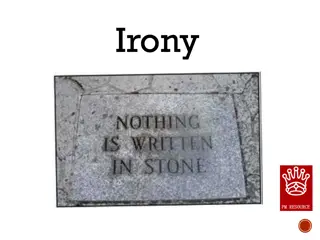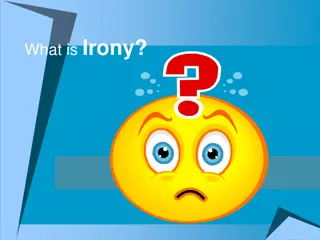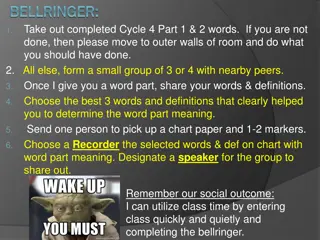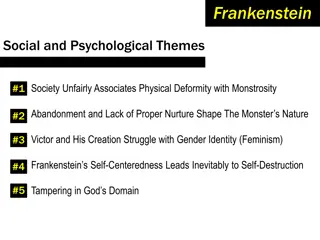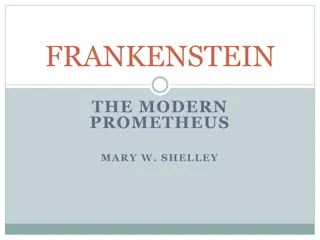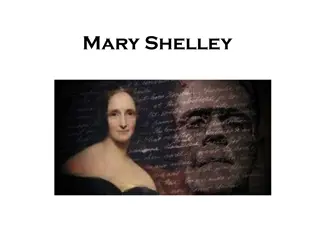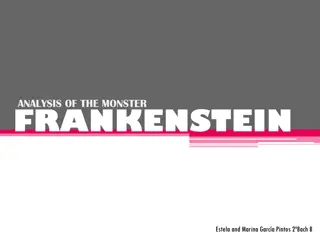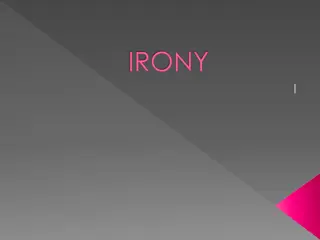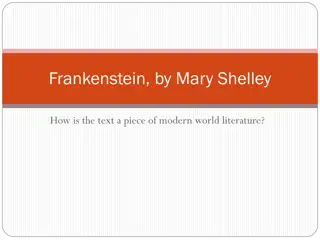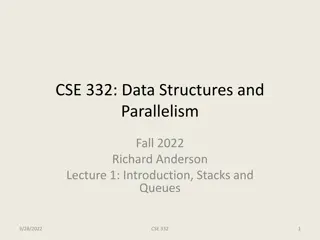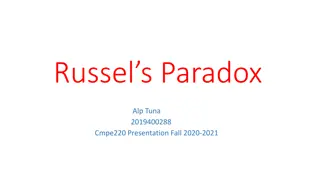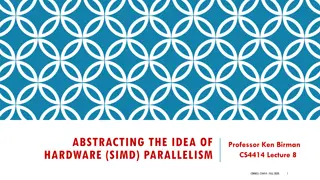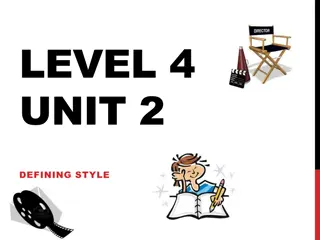Irony, Paradox, Oxymoron, and Parallelism in Frankenstein
Exploring the concepts of irony, paradox, oxymoron, and parallelism in Mary Shelley's "Frankenstein." The discussion covers different types of irony such as situational, verbal, and dramatic, highlighting instances from the novel. Additionally, the concept of paradox is examined, showcasing statements that appear contradictory but hold deeper meaning. The analysis delves into how these literary devices contribute to the complexity of the story and characters in "Frankenstein."
Download Presentation

Please find below an Image/Link to download the presentation.
The content on the website is provided AS IS for your information and personal use only. It may not be sold, licensed, or shared on other websites without obtaining consent from the author.If you encounter any issues during the download, it is possible that the publisher has removed the file from their server.
You are allowed to download the files provided on this website for personal or commercial use, subject to the condition that they are used lawfully. All files are the property of their respective owners.
The content on the website is provided AS IS for your information and personal use only. It may not be sold, licensed, or shared on other websites without obtaining consent from the author.
E N D
Presentation Transcript
Irony, Paradox, Oxymoron, and Pararellelismin Frankenstain
Summary 2
IRONY According Perrine (1974: 612), Irony is use of words by hiding true intentions with intentions. to Laurence literal
Abrams (1999:165) defines nine categories and subcategories of irony,thereare verbal, structural, stable and unstable, Socratic, dramatic, tragic, cosmic, and Romantic--along with comments upon several related terms (sarcasm, invective, and so on). 4
IRONY IN FRANKENSTEIN Situational irony I shall be with you on your wedding-night (Chapter 20: pg. 206) It is ironic because the monster said he would be with Frankenstain on his wedding night. We can infer that the monster would kill him, but instead he meant that he will kill his wife, not Frankenstain. It is Situational irony because Frankenstain thought the creature would kill him but actually the creature killed his wife.
IRONY IN FRANKENSTEIN Verbal irony Here then I retreated, and lay down happy to have found a shelter, however miserable, from the inclemency of the season, and still more from the barbarity of man (Chapter 11: pg. 123-124) Ironically, even though the creature found a place to stay and watch people at the cottage. observing their kindness actually causes the monster to suffer, as he realizes truly how lonely he is. Shelter should be a place where we can find ourselves comfort but for the monster it was place where he feels solitude.
IRONY IN FRANKENSTEIN Dramatic irony Frankenstein! you belong then to my enemy to him towards whom I have sworn eternal revenge; you shall be my first victim. (Chapter 16: pg. 171) It is ironic because the monster said to Frankenstein s son that he wanted Frankenstein which is his creator to be his enemy and victim. And after that, the creature kill Frankenstein s son.
Paradox Paradox is a statement which seems on its face to be logically contradictory or absurd, yet turns out to be interpretable in a way that makes sense.
Felix was too delicate to accept this offer, yet he looked forward to the probability of the event as to the consummation of his happiness (page 145) She thanked him in the most ardent terms for his intended services towards her parent, and at the same time she gently deplore her own fate (page 146) She fell, however, into good hands ( page 150)
Oxymoron Based on Abrams glossary of literary term, if the paradoxical utterance conjoins two terms that in ordinary usage are contraries, it is called an Oxymoron.
Heat and Cold I bore the extremes of heat and cold with less injury to my frame . (chapter 13. page 141) Fortune and Condemned the result of which deprived them of their fortune and condemned them to a perpetual exile from their native country . (chapter 14. page 148) Perfectly unacquainted I was perfectly unacquainted with towns and large assemblages of men . (chapter 15. page 153)
Pleasure and pain I felt the greatest ardour for virtue rise within me, and abhorrence for vice, as far as I understood the signification of those terms, relative as they were, as I applied them, to pleasure and pain alone . (chapter 15. page 153) Burning for glory perhaps, if my first introduction to humanity had been made by a young soldier, burning for glory and slaughter . (chapter 15. page 153)
Parallelism Based on Abrams glossary of literary term, parallelism that is, a similar word order and structure in their syntax. the parallelism in the syntax is made prominent by alliteration in the antithetic nouns: Resolved to win, he meditates the way, By force to ravish, or by fraud betray.
No father had watched my infant days, no mother had blessed me with smiles and caresses (chapter 13. page 142) They are kind they are the most excellent creatures in the world; but, unfortunately, they are prejudiced against me. (chapter 15. page 159) I knelt on the grass and kissed the earth and with quivering lips exclaimed, By the sacred earth on which I kneel, by the shades that wander near me, by the deep and eternal grief that I feel, I swear; and by thee, O Night, and the spirits that preside over thee, to pursue the daemon who caused this misery, until he or I shall perish in mortal conflict. (chapter24. page 250) so virtuous and magnificent, yet so vicious and base?(chapter13. page 140)
Chapter 15 page 177, The Monster said there was similarities between him and Adam in paradise lost, I think this is also Parallelism because the word key of Parallelism is similarities. I often referred the several situations, as their similarity struck me, to my own. Like Adam, I was apparently united by no link to any other being in existence; but his state was far different from mine in every other respect. He had come forth from the hands of God a perfect creature, happy and prosperous, guarded by the especial care of his Creator; he was allowed to converse with and acquire knowledge from beings of a superior nature, but I was wretched, helpless, and alone. Many times I considered Satan as the fitter emblem of my condition, for often, like him, when I viewed the bliss of my protectors, the bitter gall of envy rose within me.
THANKS! Any questions? 16
